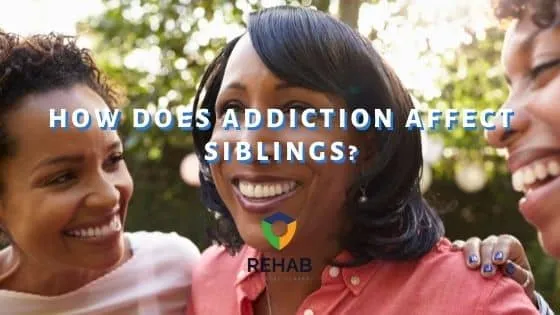Table of Contents
When someone lives with addiction, it often becomes the center of their life. Work, school, hobbies, and relationships often fall by the wayside as their addiction intensifies and takes hold of their focus. As a result, people with addiction often experience strained relationships with those around them.
Relationship strain is especially common among family members, especially siblings of addicts. If you have an addicted sibling, you likely understand how addiction can test the bonds between people–even those who love each other and have a shared history.
Living with an addicted sibling is challenging. Family members often live in a constant state of anxiety, guilt, anger, or hopelessness as they watch the addiction wreak havoc in their loved ones’ lives. You do not have to carry the weight of these feelings alone. With treatment and support, siblings of addicts can learn to cope with their complicated emotions and help their loved ones work through addiction together.
Recognizing the Impact of Substance Abuse on Siblings of Addicts
When one family member lives with addiction, the entire family is affected. Often, the addicted family member requires more and more attention as they begin to experience the emotional, physical, financial, and sometimes legal consequences of their addiction.
This is true in families with addicted siblings. Parents, grandparents, and other family members may shift their focus to the addicted sibling and their needs. This can make the other siblings feel overlooked. Siblings of people struggling with addiction often respond to this shift of attention with anger, depression, or anxiety. They may also withdraw from their family.
In many cases, siblings of addicts may struggle to have their own needs met. In some cases, this may result in the siblings of addicts adopting destructive roles to cope with their complex emotions. An addict’s sibling may respond differently based on their age and place in the family.
How Addiction May Impact Younger Siblings
Younger family members, especially children or teens, may react differently to an addicted sibling than the older members. Sometimes, younger siblings may not have the information they need to understand what their addicted sibling is going through.
Parents and other older family members may keep information away from younger siblings in an effort to protect them. However, this can lead to confusion and anxiety.
Younger siblings of addicts may also struggle with unmet needs. They may desire attention or acknowledgment for their activities, interests, and milestones. Their addicted sibling’s needs may overshadow school performance, sports, or developing friendships. They may feel angry, depressed, or anxious, or they may try to get the attention they need in other destructive ways.
How Addiction Can Impact Older Siblings
Older siblings of addicts may have some of the same feelings as their younger siblings. They may resent that their milestones, such as getting married or having a baby, are overshadowed by their addicted sibling’s needs. They may also feel unsupported during hardships like going through a divorce or losing a job.
In addition to these unmet needs, older siblings of addicts may be required to take on the role of a caretaker for their addicted sibling. They may be involved in their sibling’s care or asked to make decisions about how to manage their sibling’s behavior.
In some cases, an older sibling may feel guilty if they first introduced their sibling to drugs or alcohol. This can add a layer of complexity to their emotions and may cause a sense of responsibility for “fixing” the problem.
How to Help an Addicted Sibling
If you have an addicted sibling, you likely want to help them get the treatment they need to recover from addiction. You can do some things to get your addicted sibling the help they need.
- Educate yourself about addiction, available treatment options, and recovery. The more you know about addiction, the better able you will be to offer meaningful support.
- Stay connected to your addicted sibling. Your sibling may seem angry, resentful, or indifferent to your attempts at connection, but keep offering this support. If your addicted sibling needs help, they will know they can reach out to you.
- Remember that your addicted sibling didn’t choose this for themself. Addiction is a complex condition with many roots.
Speak to your addicted sibling about getting treatment. In many cases, family members find that staging an intervention is an effective way to communicate their concerns and set boundaries as a family. Families work together with a trained specialist to plan and carry out the intervention. During an intervention, family members voice their concerns, offer immediate treatment, and outline the consequences of not getting help.
The majority of interventions successfully get a loved one to begin addiction treatment. Planning an intervention also allows family members to come together and express their own needs.
Siblings of addicts and other family members need to get support. Each family member should consider individual and family counseling, support groups, or 12-step meetings to provide an outlet for their feelings as they work to support their addicted sibling.
Get Help Today
For information about starting addiction treatment today, reach out to the specialists at Rehab Recovery Centers. They are available 24/7 for a confidential, risk-free consultation.
Get Help Today
Don’t go through the process of recovery alone. There are people who can help you with the struggle you’re facing. Get in touch with one today.


